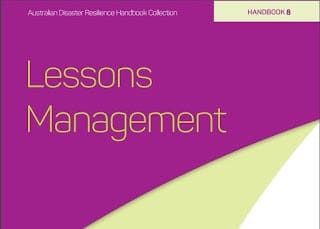
Favorite Fuzzy statements in lessons learned are very common, and are the result of “the curse of knowledge” Fuzzy MonsterClip art courtesy of DailyClipArt.net I blogged yesterday about Statements of the Blindingly Obvious, and how you often find these in explicit knowledge bases and lessons learned systems, as a by-product of the
Read More
 Shared by Nick Milton December 5, 2018
Shared by Nick Milton December 5, 2018

Favorite The curse of knowledge is the cognitive bias that leads to your Lesson Database being full of “statements of the obvious” There is an interesting exercise you can do, to show how difficult it is to transfer knowledge. This is the Newton tapper-listener exercise from 1990. Form participants into
Read More
 Shared by Nick Milton December 4, 2018
Shared by Nick Milton December 4, 2018

Favorite Lesson learning, though a simple idea, faces many barriers to its successful deployment. Here are 14 of them. I posted, back in 2009, a list of 100 ways in which you could wreck organisational lesson-learning. These were taken from my book, The Lessons-Learned Handbook, and represent the many ways
Read More
 Shared by Nick Milton December 3, 2018
Shared by Nick Milton December 3, 2018

Favorite Learning effectively from projects is a goal for many organisations. Here are some ways how to do it. Dams project team, by US Army Corps of Engineers, on Flickr The list below of success factors for project-based learning was proposed by Schindler and Eppler, two researchers working out of
Read More
 Shared by Nick Milton October 30, 2018
Shared by Nick Milton October 30, 2018

Favorite An analysis of your past lessons can be used to create a Risk Radar for future projects. Michael Mauboussin, in his book “Think Twice”, talks about the planning fallacy, and compares the inside and outside view. He points out that people planning a task or a project tend to
Read More
 Shared by Nick Milton October 29, 2018
Shared by Nick Milton October 29, 2018

Favorite People who have learned from experience must understand their responsibility to teach others. Photo by US Army Africa, on Flickr I often say at the start of Lessons learned meetings, that when identifying and recording lessons we should think of them not as something we have learned, but as
Read More
 Shared by Nick Milton October 25, 2018
Shared by Nick Milton October 25, 2018

Favorite KM in mega-projects is much the same as KM in any project, but at a larger scale and a greater degree of rigour image from wikipedia Knowledge Management as applied to projects is a pretty well-understood field (see for example my book on Knowledge Management for Teams and Projects).
Read More
 Shared by Nick Milton October 19, 2018
Shared by Nick Milton October 19, 2018

Favorite Another reprise from the archives – the idea of lessons being the “car parts” of knowledge This post is a combination of three ideas, to see if they come up with something new. Idea number 1 – the idea of an organisation as a knowledge factory, sparked by Lord
Read More
 Shared by Nick Milton October 5, 2018
Shared by Nick Milton October 5, 2018

Favorite Knowledge Management requires knowledge seeking and knowledge sharing. But why so much focus in internal processes on sharing and so little on seeking? Learning Happens by shareski, on Flickr One of the standard models for Knowledge Management in project environments is the idea of “Learning Before, During and After“.
Read More
 Shared by Nick Milton October 4, 2018
Shared by Nick Milton October 4, 2018

Favorite Lesson Management is a core component of Lesson Learning. Here are the story of how this capability was developed in Australian emergency services. This comes from the recent issue of the Australian Journal of Emergency Management, where Heather Stuart and Mark Thomason describe how Lesson Management was first recognised
Read More
 Shared by Nick Milton May 9, 2018
Shared by Nick Milton May 9, 2018
![]() Shared by Nick Milton December 5, 2018
Shared by Nick Milton December 5, 2018









